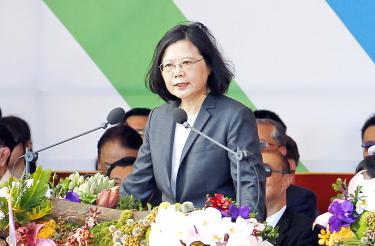President Tsai Ing-wen (蔡英文) yesterday pledged to defend the nation’s freedom and democracy as she called on Chinese leaders to work together to create new models of cross-strait interaction to lay a more solid foundation for long-term peace and stability.
In her Double Ten National Day address titled “Better Taiwan,” Tsai said the government would work to strengthen the combat and defense capabilities of the armed forces and pursue military reform to better safeguard the nation and protect freedom and democracy.
She also said that the nation remains committed to maintaining peace and stability in the Taiwan Strait and across the region.
Tsai said that as commander-in-chief, she has fully taken responsibility for military reform.
“Faced with the growing demands of modern warfare, we must ensure that our new-generation military focuses not on quantity, but quality. We must be more prepared for growing threats in cybersecurity and espionage, and be more capable of protecting our critical infrastructure,” Tsai said.
She pledged to continue to build up Taiwan’s indigenous defense industry through technical exchanges, including a commitment to build the nation’s own fighter jets and submarines.
The purpose of military reform is not to seek war, but to safeguard Taiwan’s freedom, democracy and way of life, as well as to ensure the right of the Taiwanese to decide their own future, Tsai said.
She said that cross-strait relations is an issue that affects the nation’s future and the long-term welfare of its 23 million people, adding that “we have exerted maximum goodwill” to safeguard the peaceful and stable development of such ties.
Although political differences between the two sides of the Strait have led to some complications, Tsai said that her administration has “nevertheless worked to maintain the basic stability of cross-strait relations.”
Beijing has cut off channels of communication between the two sides and pressed two of the nation’s diplomatic allies to switch recognition to China since Tsai took office in May last year.
Tsai reiterated her oft-stated position that “our goodwill will not change, our commitments will not change, we will not revert to the old path of confrontation and we will not bow to pressure.”
“This has been my consistent position on cross-strait relations,” she said.
As this year marks the 30th anniversary of cross-strait exchanges since Taiwan lifted a ban on veterans visiting China in 1987, the president said that over the past 30 years, hostility between the two sides has been replaced by peaceful development and a new chapter has been written in cross-strait ties.
“Key to this was that both sides were able to put aside political differences in order to be pragmatic and realistic,” Tsai said, adding that in the course of exchanges and interactions, both sides accumulated goodwill and established new interactions and ways of thinking.
She called on Beijing to treasure these hard-fought results and the accumulated goodwill from the past 30 years.
“On this existing basis, we hope for more breakthroughs in the cross-strait relationship,” Tsai said.
Enumerating the areas in which progress has been made over the past year, she said her administration would continue to work hard to fulfill its commitments and push reforms to provide a better life for Taiwanese.




